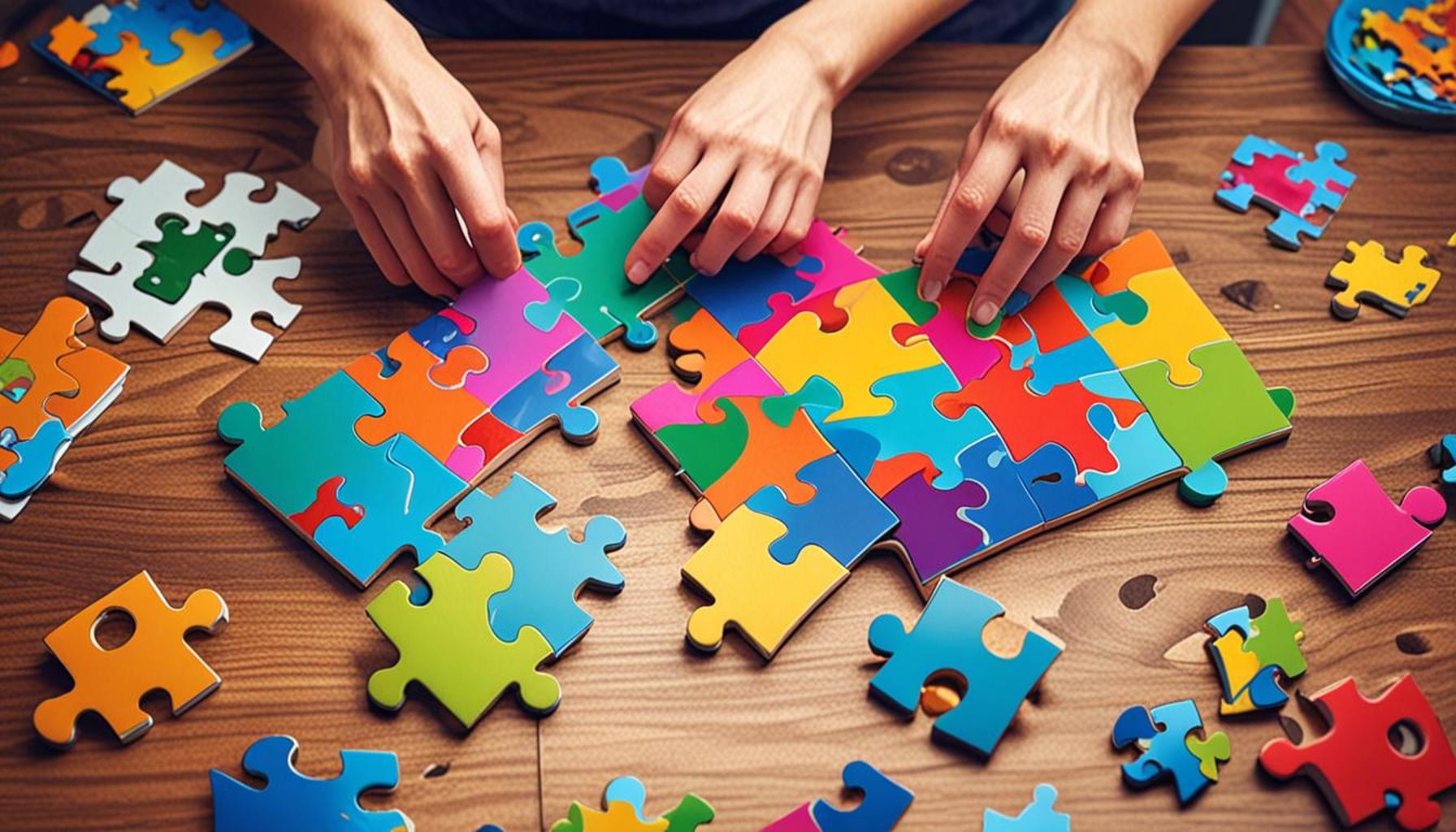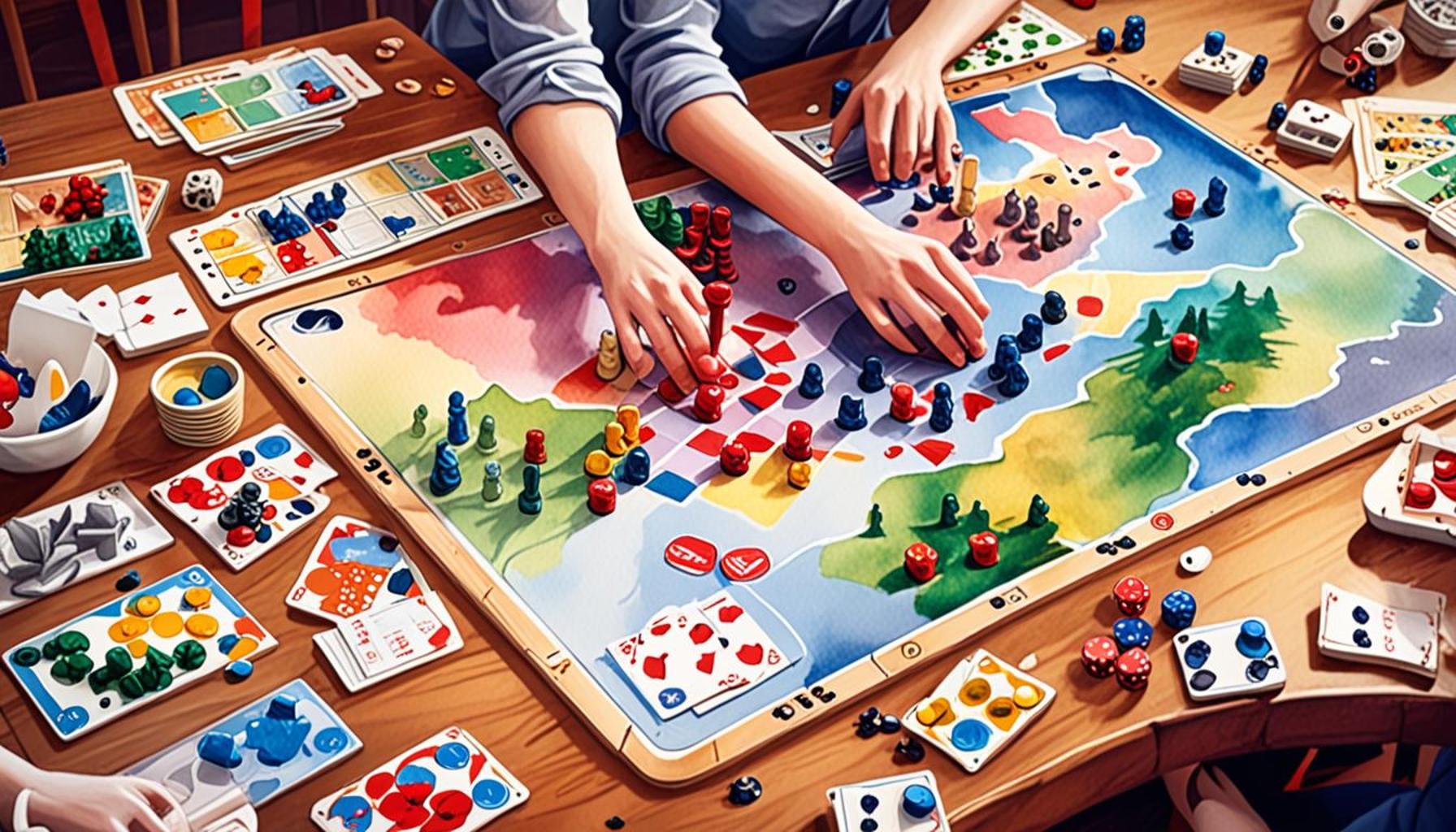How Cooperative Puzzles Can Improve Team Problem Solving

Unlocking Team Potential Through Cooperative Puzzles
In today’s fast-paced workplace, effective problem-solving is crucial for success. Teams frequently encounter intricate challenges that demand creativity and collaboration. One innovative solution to enhance these essential skills is the use of cooperative puzzles. These engaging activities not only entertain but also serve as an invaluable tool for enhancing teamwork and driving improved outcomes.
The beauty of cooperative puzzles lies in their ability to create an atmosphere of collaboration. When team members come together to solve a challenge, they naturally engage in a cycle of communication, brainstorming, and collective creativity. As research shows, teams that actively collaborate tend to outperform those that work in isolation, showcasing the importance of shared experiences in building team chemistry.
- Boost Communication: Working collaboratively on puzzles creates a platform for open dialogue. For example, when solving a jigsaw puzzle, team members must describe their thoughts and strategies, promoting not only verbal communication but also active listening skills. This dynamic fosters an environment where everyone feels valued, encouraging team members to voice their ideas freely.
- Encourage Collaboration: Team members learn to rely on each other’s strengths, which promotes a sense of unity and trust. For instance, in a problem-solving escape room activity, individuals might excel in different areas such as logic or creativity, prompting them to delegate tasks based on their unique strengths. This reliance on one another creates deeper connections and reinforces the idea that success is a group achievement.
- Enhance Problem-Solving Skills: Facing a mutual challenge cultivates innovative approaches to complex situations. Through puzzles, teams are encouraged to think outside the box. Research indicates that the act of puzzling stimulates the brain’s creative centers, leading to greater flexibility in thought. For example, completing a complex crossword puzzle might inspire new ways of tackling an unrelated project by thinking of analogies and connections.
As organizations strive to enhance workplace culture and performance in a competitive environment, incorporating cooperative puzzles can serve as an innovative and enjoyable tool. These activities create opportunities for team building that go beyond traditional methods, making problem-solving not only productive but also engaging and fun.
Curious about how to seamlessly integrate this approach into your team dynamics? Explore various types of puzzles, such as logic puzzles, mystery-solving games, or even technology-assisted apps designed for collaborative problem-solving. Each option offers distinct benefits for team problem-solving and can invigorate your team’s spirit while honing essential workplace skills. The journey to a more cohesive and innovative team might just begin with a puzzle!
DISCOVER MORE: Click here to dive deeper

The Mechanisms Behind Cooperative Puzzles
Cooperative puzzles are more than just a fun distraction from daily tasks; they are powerful tools that can significantly boost team problem-solving capacity. When teams engage in these activities, they tap into a variety of cognitive and emotional mechanisms that enhance their collaborative abilities. Understanding how these puzzles can reshape teamwork is vital for organizations seeking to thrive in a competitive landscape.
At their core, cooperative puzzles are designed to challenge participants in a manner that necessitates group engagement. This engagement fosters an environment rich in creativity and open communication. As team members grapple with challenging scenarios or intricate tasks, they begin forming a collective mindset geared toward exploration and problem resolution. In fact, studies show that teams participating in collaborative problem-solving exercises report higher levels of satisfaction and improved interpersonal relationships.
Key Benefits of Cooperative Puzzles
Engaging with cooperative puzzles offers a multitude of benefits for teams, including:
- Development of Critical Thinking: When teams work on puzzles, they confront unexpected obstacles that require them to analyze their strategies critically. This process sharpens critical thinking skills, as solutions are often not straightforward and demand innovative approaches.
- Conflict Resolution Skills: Puzzles can occasionally lead to differing opinions on how to solve a problem. Navigating these differences helps team members to develop their conflict resolution skills, transforming potential discord into constructive discussions. This experience is invaluable in the workplace, where differing viewpoints play a significant role in shaping effective solutions.
- Time Management Abilities: Cooperative puzzles often come with time constraints, which simulate real-world pressure. Learning to effectively divide tasks and manage time under pressure teaches teams how to prioritize effectively, a crucial skill in any professional setting.
- Increased Adaptability: Each puzzle presents unique challenges that may require teams to pivot quickly in their approach. This need for adaptability encourages teams to become more flexible and open to change, enabling them to tackle unexpected challenges in their everyday work environments.
With the benefits of cooperative puzzles extending far beyond simple enjoyment, organizations are increasingly recognizing their potential in cultivating superior teams. Moreover, these activities provide an exciting departure from traditional team-building exercises that may feel monotonous or obligatory. By actively participating in puzzles, employees not only bond but can also learn to face challenges together, establishing a foundation of trust that is crucial for effective collaboration.
As companies explore innovative methods to elevate team dynamics, the integration of cooperative puzzles proves to be an accessible and impactful option. The next steps involve identifying which types of puzzles align most closely with specific team objectives and how they can be seamlessly woven into the fabric of workplace culture.
The concept of using cooperative puzzles as a method for enhancing team problem-solving skills has garnered significant attention in recent years. Engaging in these puzzles fosters an environment where collaboration is not only encouraged but necessary. Team members learn to communicate effectively, share ideas, and build on each other’s strengths, which is fundamental for tackling complex challenges.
Moreover, the nature of cooperative puzzles requires individuals to step outside their comfort zones. They must learn to trust their teammates, showcasing the importance of mutual respect and understanding. This development of interpersonal relationships within a team can lead to a more cohesive working environment. As team members become more attuned to each other’s capabilities, they can harness their collective intelligence to solve problems more efficiently.
Beyond improving interpersonal relations, cooperative puzzles also enhance critical thinking. As teams work through challenges, they are often faced with various obstacles that require innovative solutions. This environment of collective brainstorming cultivates creative thinking, encouraging all members to contribute their unique perspectives. Such diverse input can lead to breakthrough ideas that may not have emerged in isolation.
Additionally, the structured nature of puzzle-solving creates a safe space for teams to experiment without the fear of failure. This encourages risk-taking and experimentation, which are vital components in cultivating innovative problem-solving approaches. When teams feel secure, they can brainstorm freely, leading to comprehensive solutions that may involve unconventional strategies.
The theme of cooperative puzzles can also extend to the ongoing measurement of teamwork effectiveness. The tangible outcomes resulting from these activities can help organizations assess the development of their team dynamics and problem-solving capabilities. Regularly incorporating cooperative puzzles into team-building activities can serve as a continual challenge and growth opportunity, enhancing the overall workplace culture.
| Advantage | Description |
|---|---|
| Enhanced Communication | Facilitates open dialogue, ensuring all team members contribute equally. |
| Trust Building | Encourages team members to rely on each other, fostering a supportive atmosphere. |
| Creative Solutions | Promotes diverse input that can lead to innovative problem-solving strategies. |
| Risk-Taking | Provides a safe environment to experiment with new ideas without fear of failure. |
Incorporating cooperative puzzles into the workplace not only improves problem-solving capabilities but also strengthens the fabric of team dynamics, creating a more productive and engaged workforce.
DON’T MISS: Click here to learn how strategy games impact business decisions
Implementing Cooperative Puzzles in the Workplace
To harness the myriad benefits of cooperative puzzles, organizations must thoughtfully implement them into their team dynamics. This not only involves selecting the right types of puzzles but also effectively integrating them into existing workflows. With myriad options available, team leaders can explore a variety of cooperative puzzle formats ranging from physical escape rooms to virtual team-building exercises designed for remote employees.
Diverse Formats and Styles
Physical escape rooms, for instance, require teams to cooperate physically and mentally, providing a tangible space where collaboration is key. Participants are locked in a themed room and must decipher clues and solve puzzles within a set timeframe to “escape.” The elements of urgency and excitement inherent in these experiences drive teams to communicate promptly and effectively, honing their problem-solving skills under pressure.
In contrast, virtual puzzles can cater to the growing number of remote teams. Online platforms offer a wide range of interactive puzzles such as scavenger hunts, trivia challenges, or collaborative problem-solving games that can be accessed from anywhere in the world. For example, platforms like Kahoot! and GooseChase have gained popularity for their user-friendly interfaces and ability to promote teamwork in a remote setting, allowing teams to engage regardless of geographical barriers.
Strategies for Successful Implementation
Implementing cooperative puzzles requires strategic planning to maximize their effectiveness. First, it is crucial to assess the team’s characteristics and dynamics. For teams struggling with communication, puzzles that emphasize dialogue and negotiation will be beneficial. On the other hand, teams facing challenges in creative thinking might thrive with more abstract puzzles that encourage innovative approaches.
Furthermore, organizations should create a comfortable atmosphere where team members feel safe to express themselves without fear of judgment. Such an environment is vital for unleashing creativity and collaboration. Facilitators or team leaders should encourage participation by recognizing individual contributions and celebrating achievements, no matter how small.
Measuring Success and Continuous Improvement
To fully grasp the impact of cooperative puzzles on team problem-solving, organizations should establish metrics for success. This could involve pre- and post-activity surveys to gauge improvements in communication, problem-solving skills, and overall team cohesion. Additionally, direct feedback during and after these exercises can uncover insights into how team members felt about their experiences and the skills they developed.
- Engagement Levels: Tracking participation rates and engagement during puzzles can provide a clear picture of how well the activity resonated with team members.
- Skill Development: Evaluating skills such as time management and adaptability before and after participating in puzzle activities can help identify areas of growth.
- Team Dynamics: Regularly assessing interpersonal relationships within the team can highlight improvements in collaboration and trust resulting from shared problem-solving experiences.
By creating actionable plans for implementing cooperative puzzles and measuring their efficacy, organizations can foster sustained growth in team problem-solving abilities. The possibilities are vast, and as businesses continue adapting to an ever-evolving work landscape, cooperative puzzles serve as an engaging and impactful tool for enhancing team collaboration and productivity.
DIVE DEEPER: Click here to uncover more insights
Conclusion
In the rapidly evolving landscape of the workplace, organizations must embrace innovative strategies to enhance team problem-solving skills and foster collaboration. Cooperative puzzles offer a unique and effective approach to achieving these goals, as they engage teams in dynamic problem-solving experiences that promote communication, creativity, and trust. By integrating both physical and virtual formats of puzzles into team-building activities, companies can create immersive environments where employees learn to navigate challenges together.
Moreover, strategic implementation is key to unlocking the true potential of these collaborative exercises. Understanding the specific dynamics and needs of each team allows leaders to choose the most suitable puzzles, which can subsequently lead to improved engagement and skill development. Regular evaluation of these activities through feedback and measurable outcomes will provide insights into their effectiveness and ensure continuous improvement.
Ultimately, as organizations look towards future growth and success, investing in cooperative puzzles as a tool for enhancing team dynamics is not just an option but a necessity. As teams learn to work together more effectively, not only do they solve problems with greater efficiency, but they also foster a workplace culture rooted in collaboration and shared success. The journey towards improved team problem-solving starts with embracing the challenges and joy of working together through cooperative puzzles, yielding lasting benefits for the entire organization.


